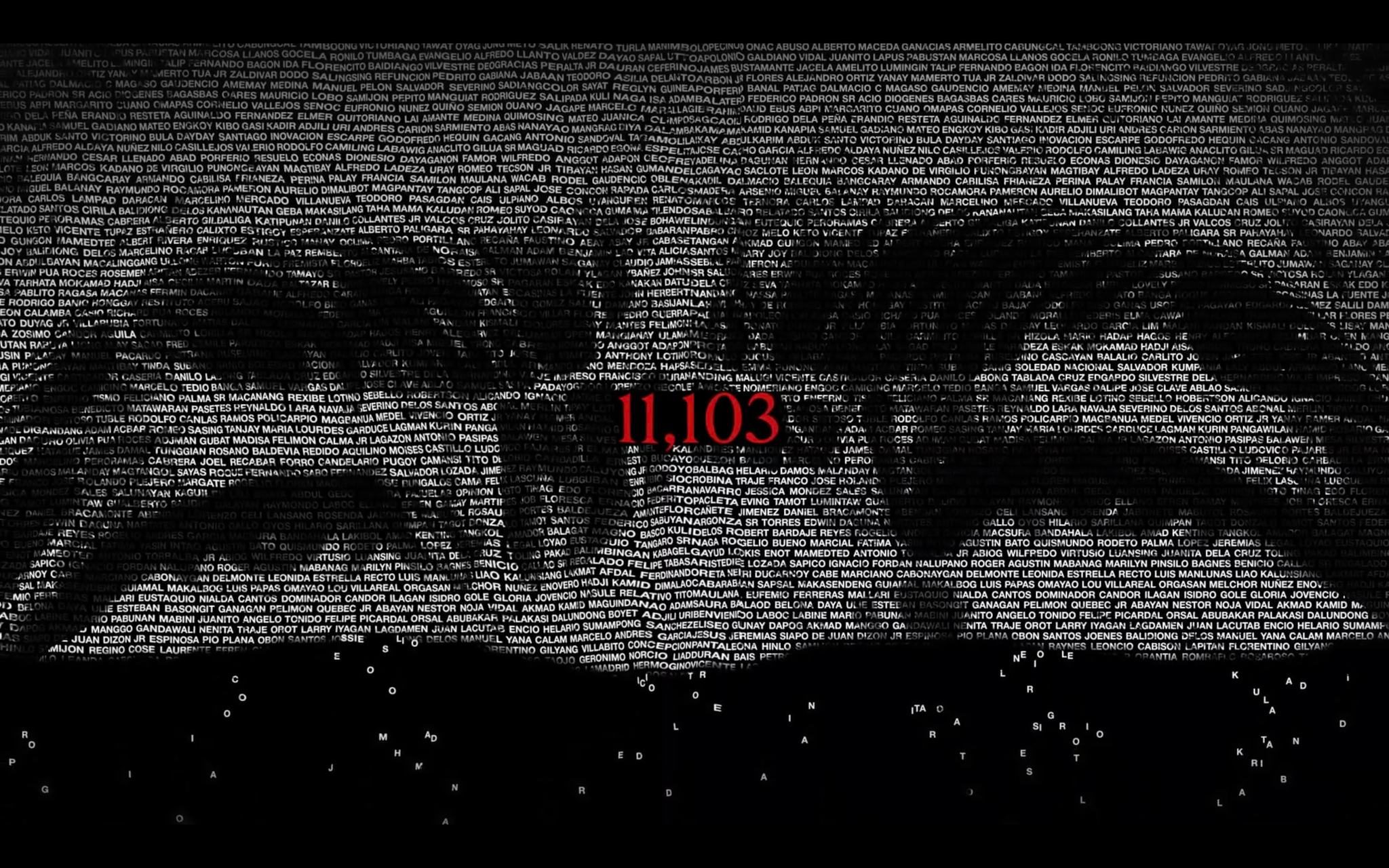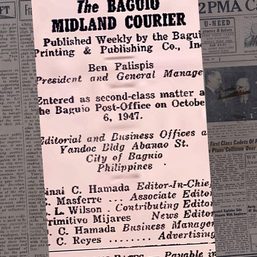SUMMARY
This is AI generated summarization, which may have errors. For context, always refer to the full article.

Spoilers ahead.
It is difficult to walk away from 11,103 without being awed by its brazenness.
The documentary, directed by Jeannette Ifurung (Batas Militar) and Mike Alcazaren (Patay Kung Patay), tracks the lives of a select few who are recognized by Republic Act No. 10368, otherwise known as the “Human Rights Victims Reparation and Recognition Act of 2013,” which was created to acknowledge the violations that occurred during the Martial Law era and to provide reparations to the victims. Yet 50 years since Ferdinand Marcos Sr. first declared martial law, we find ourselves in the same suffocating conditions as our parents and grandparents, with the Marcos family back in power.
Such cruel irony is not lost on the film. Instead, it uses it to create a sociopolitical snapshot of this important junction in history where witnesses are called to be activists. But 11,103 does not go for poetics. Rather, it is straightforward prose — unfolding almost like a fractured fairy tale divided into chapters named after the victims it chooses to follow. Editor Lawrence S. Ang (Leonor Will Never Die; Violator) juxtaposes the suffering endured under Martial Law by a dying generation with the slow return to power of the Marcos family in the 2022 elections. What emerges from this is a race against erasure at the hands of time, state-sponsored efforts, and indifference – with Ifurung and Alcazaren transforming Bantayog ng mga Bayani into one of the last strongholds preserving truth and historical memory in the country.
11,103 relies on the strength of its subjects and the clarity of its positioning — confident that, in the face of truthful stories of suffering, Filipinos will respond with empathy. Each survivor or family member recounts their gruesome experiences and narrates how their lives were upended following the violence inflicted upon them, their outlook and actions radically changing their personal trajectories. Ifurung and Alcazaren attempt to fill in the gaps in the nation’s collective memory already captured in documentaries and in historical fiction by focusing on the smaller stories often ignored, from areas such as La Union, Nueva Vizcaya, and various parts of Mindanao where such atrocities remain underreported or undiscussed until recently.
Whatever is lost to time is visualized in brutal detail through hand-drawn illustrations and animations by a collection of artists facilitated by Franny Ocampo, resulting in images that seem to come from a twisted graphic novel. These contrasts between gore and accessibility from this visual style are highlighted when the Palimbang massacre in Sultan Kudarat is recounted. Previously tackled by Teng Mangansakan in his 2016 documentary Forbidden Memory, Ifurung and Alcazaren depict how individuals were corralled into mosques only to be killed — a scene horrifyingly reminiscent of Elem Klimov’s Soviet anti-war film Come and See, with such savageries occurring around the same time in Belarus and the Philippines in the 1970s.
11,103 challenges the Manila-centric narrative of Martial Law that limits it to myth and demonstrates that many of the state-sponsored brutalities remain to be unearthed. In ignoring these stories at the periphery, we reinforce what writer Anna Canlas describes, albeit in a completely different context, as “systematic stealing [which] thrives in inattention.”
Unlike other recent films that merely capitalize on the anti-Martial Law sentiment without actively connecting to or serving the communities it has affected, 11,103 extends beyond what narratives it chooses to highlight and commits to accessibility. Forgoing the traditional festival route that promises prestige or the nationwide theatrical release that promises capital, the community-driven process that enabled its creation is mirrored in its distribution — with Ifurung, Alcazaren, and producer Kara Magsanoc-Alikpala (Delikado; Batas Militar) making the film freely available to the Filipino public across the globe through free community screenings at key cities. Combined with the decision to subtitle the film in Filipino, 11,103 makes it clear that it is a film made by Filipinos for Filipinos. Though one hopes that, in its expansion towards more rural areas, that it will have translations available in many other regional languages.
Yet the film is not without its gaps. Historical memory is actively and passively constructed by the structures around us and 11,103 would have benefited by delving into the lives that struggle to be included in the official count due to the limitations of the laws themselves — a concern recently expounded upon by lawmakers from the Makabayan bloc. There are survivors who do not have all the necessary documents to prove the violence inflicted upon them; those whose families refuse to subject their loved ones to the process at the risk of retraumatizing them; and those who reject the offer of compensation, knowing that financial compensation can never equate the lives lost. By skimming over the stories, 11,103 blunts its critique of how the government struggles to put the interest of its people first, and how larger systems of inequity still do not know how to handle generational transgressions.
Still, one cannot help but root for the film, especially when it focuses on the seemingly mundane. Well into the film, there is a moment when a woman breaks down while lining up to claim her reparations. The sum total of the compensation from RA 10368 is only around P75,000 — a sum that shrinks in size when considered across time and even smaller against the magnitude of the trauma. Two other women rush to comfort her — one holds her face, the other her right hand. Such gestures speak of closeness yet they are strangers to one another, their lives bound only by the cruel hand that the state has cast on them and their families.
It is in this frame that the film’s message is crystallized: remembering cannot be the task of the survivor alone. Instead, it must be viewed as an act of solidarity, an acknowledgment of the history that haunts us individually and collectively; that will continue to haunt us if left untold. Subjecting themselves to the process is not an act of cruelty or subservience, but of faith — that stories like these will no longer be erased; that there will be systems that will be dedicated to commemorating their struggles and their lives; that there will be a culture that will be brave enough to stand up to the monsters before they grow too powerful.
Justice is a relay race. 11,103 speaks into existence the collective hopes of survivors for a future that will no longer have wounds left to heal, nor scars to reopen. They only ask us to take the baton, hold on tight, and run, run, run… – Rappler.com
‘11,103’ will be screening for free at the Bantayog ng mga Bayani on September 21, 2022 at 6 to 9 PM as part of the 10th Active Vista International Human Rights Festival. For more information regarding block screenings, visit their website.
Add a comment
How does this make you feel?

![[OPINION] Martial Law and media repression, a collective memory](https://www.rappler.com/tachyon/2022/09/collective-memory-martial-law.jpg?fit=449%2C449)

![[OPINION] Raised on radio](https://www.rappler.com/tachyon/2024/04/raised-on-radio.jpg?resize=257%2C257&crop=396px%2C0px%2C720px%2C720px)
![[Just Saying] Marcos: A flat response, a missed opportunity](https://www.rappler.com/tachyon/2024/04/tl-marcos-flat-response-april-16-2024.jpg?resize=257%2C257&crop=277px%2C0px%2C720px%2C720px)


There are no comments yet. Add your comment to start the conversation.